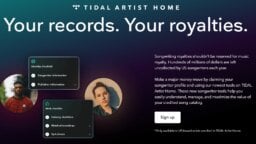Songwriters have made plenty of noise about not being paid their fair share from streaming services of late.
But their crusade for a bigger slice of the monetary pie isn’t stopping at recorded music: now they’re going after the price of concert tickets. And the UK live music industry could eventually be forced to pay more to songwriters – and, potentially, less to artists – as a result.
The amount of cash due to songwriters from a pop concert or festival under current UK legislation currently works out at 3% of gross ticket sales.
This proportion was laid down in UK law in a Tariff set in 1988, which is still in operation today. A Performing Right Tribunal ruled that an artist performing on stage was “significantly more important” than their underlying songs, and should therefore be paid more handsomely than songwriters for every ticket sale.
However, PRS For Music – which is tasked with collecting this fee from UK live concerts for its members – is now arguing that this rationale is inaccurate and based on the “subjective opinions of individual witnesses, rather than upon any objective independent evidence”.
It has released “statistically robust” consumer research which, it says, proves that the idea of a show’s artist being materially more valuable to consumers than its songwriters “does not hold good” in 2015.
It claims that its research – based on a multiple-choice online survey conducted by FTI Consulting in August 2014 – has produced “a fact-based and objective analysis” of the modern live music consumer’s financial priorities.
You may be able to guess what it concludes:
- “The value of a musical composition is broadly commensurate to the value of the performance”;
- “Musical works being performed at concerts and festivals are of similar importance to attendees as the performances of those musical works themselves.”
The survey’s results even go as far as suggesting that songwriting is actually worth more in real monetary terms to concert ticket-holders than an artist’s performance – although it acknowledges this isn’t quite the case when it comes to festivals**.
In light of this and other key findings of the research, PRS has opened an eight-week consultation with members and live music stakeholders with a view to reviewing the current tariff.
And, well, that’s it… for the time being.
After PRS has received feedback from songwriter members, as well as promoters, venue owners and ticket operators, it will publish a summary. Only once that summary’s in the public domain can the collection society begin to push for legislative change and a new UK tariff.
If it does, it’s might not only face strong opposition from the live industry, but from artist representatives too.
As mentioned, songwriters currently receive 3% of gross ticket sales in the UK – the top-line revenues that pass from consumers to ticket operators. Inevitably, if that percentage is going to increase, another part of the pie will have to reduce.
Considering that many artists are now signed up to label contracts which see their record companies participate in their live revenues – including sponsorship of their tours – such a move could feasibly result in a major industry-wide tussle.
Artist contributions aside, PRS says there are a few other reasons why it is time for a review of the 1988 tariff. These include:
- Secondary Ticketing: PRS notes that “the increasingly valuable online secondary ticket market” is estimated to be worth £1bn in the UK. It accuses live music event organisers of “seem[ing] to derive considerable value” from allocating primary tickets to agents direct on the secondary market. PRS notes that it believes the 1988 Tariff should mean that a % of secondary ticket sales should already go to songwriters;
- Booking Fees: PRS says that the past 27 years has seen “increased significance of fees associated with ticket buying”, adding that “in the past such fees may have been set to offset the actual costs incurred by the promoter or ticket agent in completing the transaction, but today this principle does not seem to drive the setting of such fees”.
- Sponsorship, Advertising and more: More sophisticated sponsorship and advertising models have grown since the last Tariff, says PRS, particularly thanks to the use of “fan data” by promoters to link with brands. PRS also notes the increase importance of other revenues streams such as “live event catering revenue, parking concessions and merchandise sales”;
- ‘Failures of accounting’: In a statement, PRS warns: “We are concerned that, despite what we have stated above about the obligations on licensees to account in respect of secondary income and booking fees, licensees under Tariff LP appear not to have been accounting to us on the basis of their full revenues. We reserve our position as to the retroactive recovery of the associated royalties owed by any licensees from these items.”
** PRS concludes of FTI’s research: “The analysis demonstrates that the musical works being performed at concerts and festivals are of similar importance to attendees as the performances of those musical works themselves: (i) In the case of a concert, the incremental value of the composition is, on average, 126% of the incremental value of the performance; and (ii) In the case of a festival, the incremental value of the composition is, on average, 92% of the incremental value of the performance.”Music Business Worldwide




